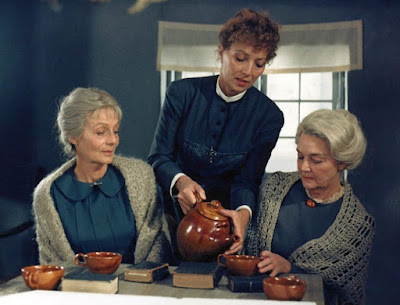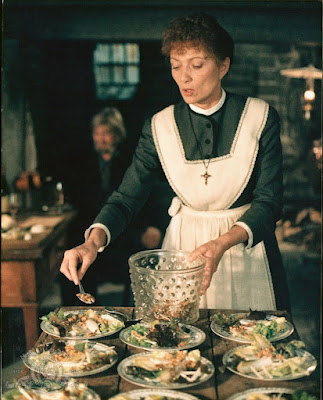 contemplative stance or presentation perspective, but rather that it induced in me a tendency to contemplate about life’s meaning throughout my watching of the film. Axel’s script was a close adaptation of Danish writer Isak Dinesen’s (the pen name of Karen Blixen) famous story “Babette's Feast” [1], which first appeared in Ladies' Home Journal magazine in 1950. Isak Dinesen, of course, is most renowned for her marvelous memoir Out of Africa (1937) concerning her experiences in British East Africa. The film Babette’s Feast won the Oscar for Best Foreign Language Film at the 1987 U.S. Academy Awards, and it has been highly regarded ever since by the critical community [2,3,4,5,6,7,8,9,10,11,12]. And also, in light of the theological aspects of this film’s story, it is interesting to note that Babette’s Feast is Pope Francis’s all-time favorite film [11].
contemplative stance or presentation perspective, but rather that it induced in me a tendency to contemplate about life’s meaning throughout my watching of the film. Axel’s script was a close adaptation of Danish writer Isak Dinesen’s (the pen name of Karen Blixen) famous story “Babette's Feast” [1], which first appeared in Ladies' Home Journal magazine in 1950. Isak Dinesen, of course, is most renowned for her marvelous memoir Out of Africa (1937) concerning her experiences in British East Africa. The film Babette’s Feast won the Oscar for Best Foreign Language Film at the 1987 U.S. Academy Awards, and it has been highly regarded ever since by the critical community [2,3,4,5,6,7,8,9,10,11,12]. And also, in light of the theological aspects of this film’s story, it is interesting to note that Babette’s Feast is Pope Francis’s all-time favorite film [11].
The film’s story covers three time periods, during which significant events took place for the two sisters, Martine and Philippa:
- A period some 49 years before “the present” (“the present” takes place in the late 19ths-century), during which time some significant events take place for Martine and Philippa.
- A time 35 years later when a French woman refugee, Babette Hersant, comes to the village and begins working for the two sisters as their cook and maid.
- “The present”, when Babette prepares her special feast.
A little later another visitor comes to the village, this time a famous French opera singer, Achille Papin (Jean-Philippe Lafont), who has come to get away from the Parisian hustle and bustle for a while. He happens to hear Philippa (in this section played by Hanne Stensgaard) singing in church and is overwhelmed by the wondrous quality of her voice. Achille manages to convince Philippa’s father to let him give her singing lessons so that he can make her into an operatic superstar. Achille wants to do this because of his lifetime devotion to artistic expression. But, of course, he is also romantically attracted to Philippa. However, Achille’s passionate and exuberantly affectionate style of personal interaction is too much for the demure Philippa, and she has to discontinue the lessons. So Achille has to return to Paris unfulfilled.
The letter of introduction explains that Babette is a refugee from the Paris Commune uprising of 1871 and that her husband and son had been killed in the conflict. Fearing for her life, Babette has fled Paris, and Achille, recalling the kindness of the two Danish sisters, asks them to take her in. The sisters explain to Babette that they have almost no money, but Babette tells them that she is willing to work for them for nothing as their cook and maid. So the sisters take her in and begin patiently explaining to Babette how to make the simple, bland cuisine that they are used to.
Period 3 - “the present”
So now we come to “the present” time, and Babette has been working diligently for Martine and Philippa for fourteen years, and she has become a familiar background character to the dwindling number of people of the local parish that the sisters look after. One day, however, Babette receives a message from a friend in Paris who has been buying a lottery ticket every year for Babette that informs her that she, Babette, has just won the Paris lottery of 10,000 francs.
The film now devotes considerable time to showing Babette’s lavish preparations for the banquet. Babette imports all sorts of exotic ingredients, as well as elegant plates and cutlery. As the sisters and parishioners become aware of all these preparations, they begin to worry that it will be a sinful event, and they make a vow not to mention the food or express any appreciation at the dinner.
“There comes a time when your eyes are opened
And we come to realize that mercy is infinite.
We need only await it with confidence and receive it with gratitude.
Mercy imposes no conditions.
And, lo! - Everything we have chosen has been granted to us.
And everything we rejected has also been granted.
Yes, we even get back what we rejected.
For mercy and truth are met together.
And righteousness and bliss shall kiss one another.”
After the feast is over, the sisters assume that Babette will return to Paris., but Babette tells them that she used all of her 10,000 francs to pay for the expenses of putting on the feast and that she is not going away. She did it, because she wanted to give everything in her power to the world in which she had been living. This was, for her, the ultimate act of self-expression.
Although the basic story of Babette's Feast seems simple, the film has fascinated critics and won an Oscar. Some people are drawn to the numerous allusions in the film to Christian symbolism, including The Last Supper (Babette's feast offered dinner for 12 guests). But I think that the profundity of the film lies elsewhere. To me the film features four distinct outlooks on what we should seek in life, and these outlooks are personified by four separate personages:
- Martine and Philippa
- Lorens Löwenhielm
After Löwenhielm’s failed infatuation with Martine, he devoted himself to the attainment of personal glory and honors. When he is seen in the latter part of the film, it is evident that he had attained what he had sought, but we get the feeling (something his closing toast confirms) that he senses that there is still something more to life than that.
- Achille Papin
For Papin the ultimate achievement to be sought in life was ecstatic artistic expression in accordance with one’s own aesthetic gifts. But this is a very personal mode of being and does not significantly involve the serious engagement with others or with a wider spectrum.
- Babette
Babette's mission was too use all her abilities in order to selflessly, even anonymously, bring joy to others. And she did this through the wonders of food preparation and taste. Her feast was her personal gift, not just to the parishioners, but to the world.
With regard to the first three of these perspectives, Tasha Robinson remarks [8]:
“The narrative is also about the emptiness of most pursuits: General Lorens is dissatisfied and confused after devoting his life to a spectacular career. The Puritans are bitter and judgmental after devoting their lives to religion. Martine and Filippa find satisfaction in devoting their lives to their father, but are left bereft after his death, watching the consensus he built crumble.”
And in this vein of multiple life perspectives, Mark Le Fanu further adds [9]:
“Thus there are two stories, at least, going on in the closing stages of the film. Babette is busy showing us that the artist is able to respond to adversity with self-denying style and generosity, while Löwenhielm, in his after-dinner speech to the guests, is demonstrating that our choices in life—even the bad ones—are all ultimately redeemable and beneficent. Somehow, these two positions meet; at a certain level, they are identical postulates. For if Löwenhielm never sees Babette (she remains in the kitchen, outside his range of vision), he guesses she’s there—invisible, like grace—for the simple reason that, years ago in Paris, he attended a similar feast, and there is only one person in the world who could have authored this one.”
Overall and despite its modest format, Babette's Feast is a very successful cinematic consideration of our ultimate goals in life. Of course, this topic has been the subject of countless philosophical treatises where text is used to express such abstract notions. It would seem to be even more difficult to try doing this if one is confined to using the physical visual imagery of film. Nevertheless, Jean Schuler feels that Babette's Feast has actually managed to accomplish what Kierkegaard thought to be beyond the realms of possibility [4]:
“Babette's Feast achieves what Kierkegaard treated as impossible: to make the hidden movements of faith visible. A film about goodness threatens to bore its audience; a film about holiness that manages to get it right would seem to be as impossible as roses blooming in December or sitting down to a banquet fit for kings in a Jutland cottage.”

Perhaps it is best to summarize the essence of what they got right with this quote from Pope Francis, himself [13]:
“The most intense joys in life arise when we are able to elicit joy in others, as a foretaste of heaven. We can think of the lovely scene in the film Babette’s Feast, when the generous cook receives a grateful hug and praise: ‘Ah, how you will delight the angels!’ It is a joy and a great consolation to bring delight to others, to see them enjoying themselves. This joy, the fruit of fraternal love, is not that of the vain and self-centred, but of lovers who delight in the good of those whom they love, who give freely to them and thus bear good fruit”
★★★★
Notes:
- “Babette's Feast”, Encyclopedia.com, (n.d.).
- Desson Howe, “Babette’s Feast”, Washington Post, (8 April 1988).
- Rita Kempley, “Babette’s Feast”, Washington Post, (8 April 1988).
- Jean Schuler, “Kierkegaard at Babette's Feast: The Return to the Finite”, Journal of Religion and Film, (October 1997).
- Wendy M. Wright, "Babette's Feast: A Religious Film”, Journal of Religion and Film, (October 1997).
- Peter Bradshaw, “Babette's Feast – review”, The Guardian, (13 Decembet 2012).
- Nathaniel Thompson, “Babette’s Feast", Turner Classic Movies, (8 November 2013).
- Tasha Robinson, “Babette’s Feast”, The Dissolve, (23 July 2013)..
- Mark Le Fanu, “Babette’s Feast: ‘Mercy and Truth Have Met Together’”, The Criterion Collection, (22 July 2013).
- Samuel Wigley, “Then and now: Babette’s Feast reviewed”, British Film Institute, (3 April 2014).
- Philip Kosloski, “Why does Pope Francis want us to watch the movie ‘Babette’s Feast’?”, Aaleteia, (21 November 2016).
- Ezio Vailati, “Babette's Feast”, Southern Illinois University Edwardsville, (n.d.).
- Pope Francis, Amoris Laetitia: On Love in the Family, Our Sunday Visitor, (2016), p. 129.









